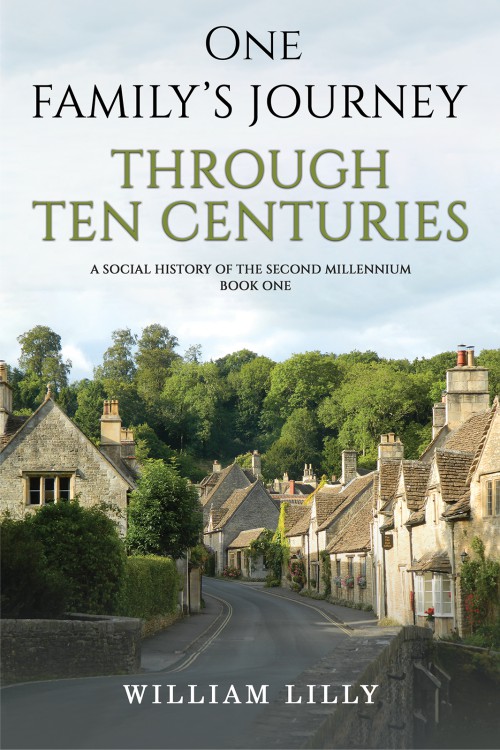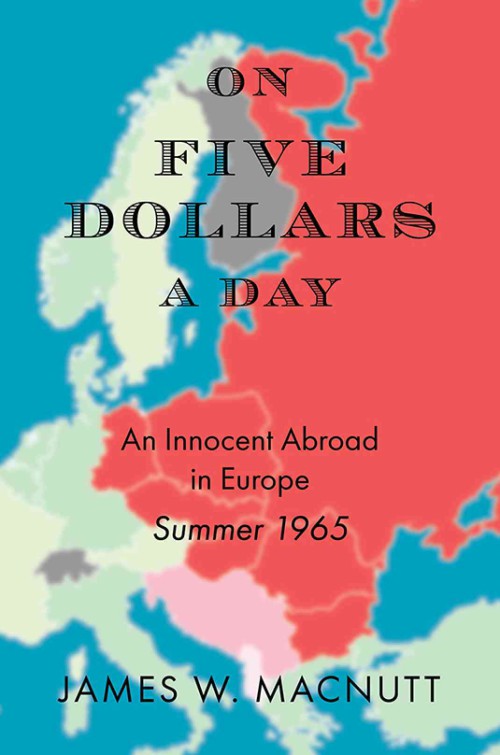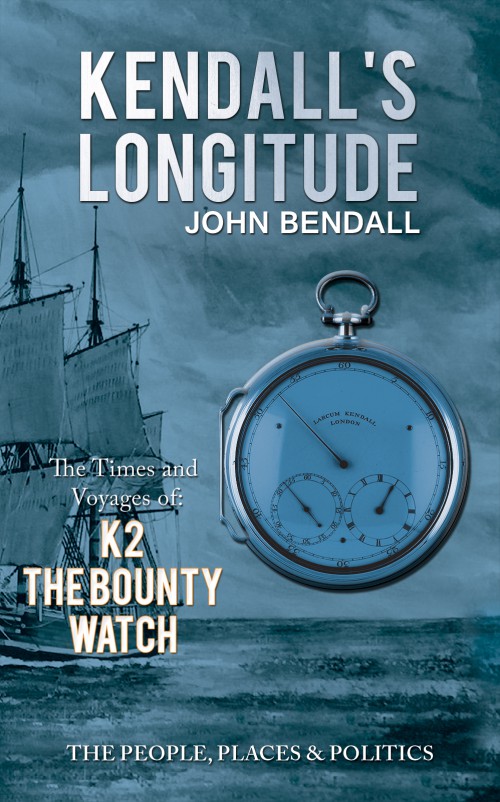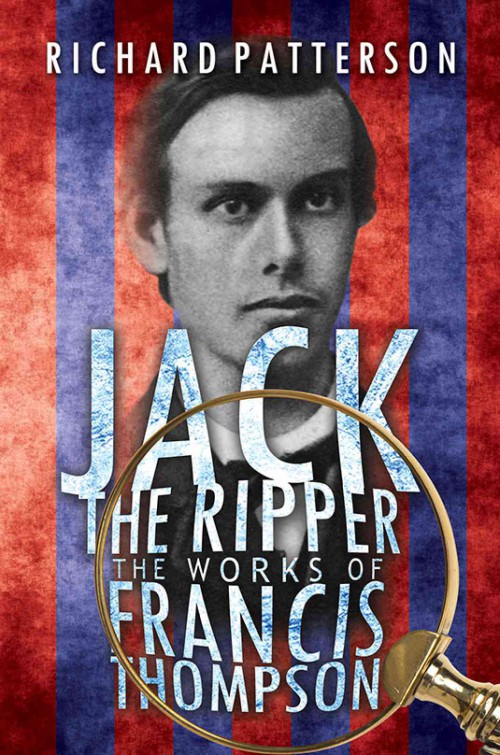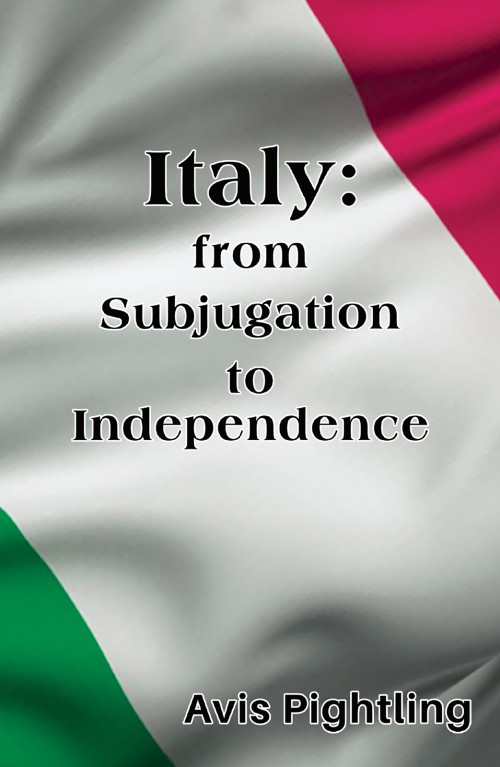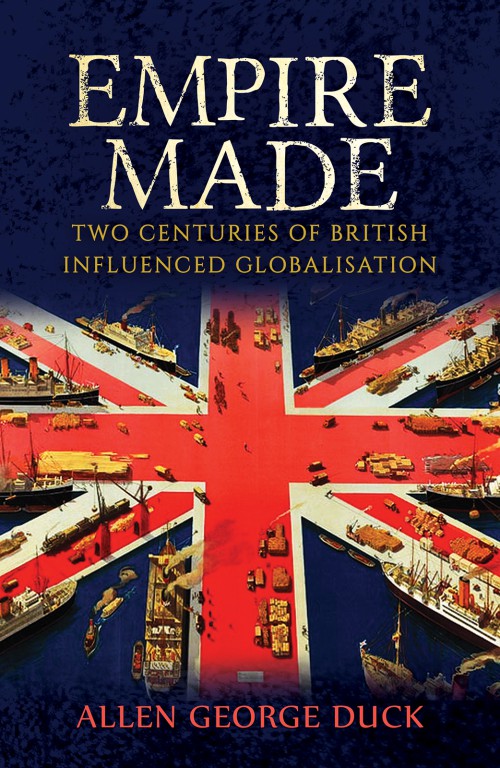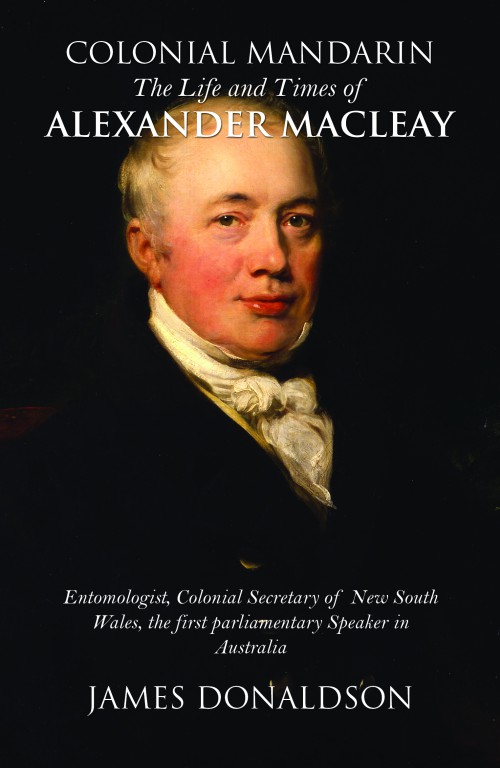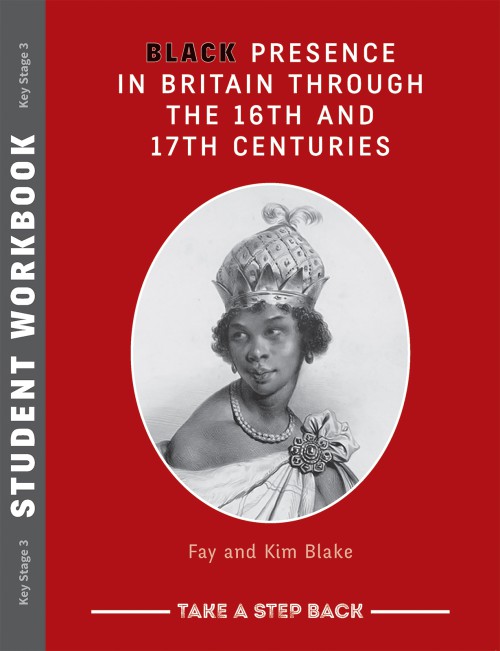-
One Family’s Journey Through Ten Centuries
We trace one family, generation by generation, throughout the one thousand years of the second millennium. The trilogy sets the family within its social environment, describing its migration from the continent, and across England, Scotland, and Ireland to settle in the New World. From that we get a vivid picture of what affected, motivated, worried, and encouraged this Saxon family and how they coped. Since the migration of this family was typical for the time, this study is relevant to millions of people in the United Kingdom, Canada, and the United States, whose ancestors followed the same general migratory path.Book I specifically covers the feudal period in the Middle Ages (1000 – 1560), where a feudal autocrat and an avaricious pope, between them, owned and controlled everything. Throughout, the family became our witnesses to many of the historic events of the feudal period: the Battle of Hastings, Anglo-Saxon resistance, the plague, the Little Ice Age, the Great Starvation, Guilds, the building of great cathedrals and castles, and the gradual decline in the king’s power and control.In 1067 William the Conqueror appointed Honfroi de Insula de L’lle as the Dominus of the area around the feudal village of Combe, Wiltshire. He permitted Honfroi to live and build a motte and bailey castle there to assist in keeping the peace. The front image is Castle Combe as it appears today.
£3.50 -
On Five Dollars a Day
In the summer of 1965, Will MacIntosh, a naive but highly inquisitive twenty-two-year-old from Canada, embarks on a life-changing excursion through Europe. Arriving there, he finds the trauma of the Second World War still fresh on every street and in every person's mind.While his high-minded purpose is to investigate the political complexities of the region and envelop himself in its cultural treasures, Will finds himself drawn to more earthly pursuits — usually alcoholic, but occasionally amorous in nature. Amongst his many adventures, Will is mysteriously spied on in Denmark, tries to discuss politics with some very polite Neo-Nazis in Lübeck, is menaced by East German guards at Checkpoint Charlie, inadvertently joins a deadly demonstration in Athens and is mistaken for the devil in Crete.Tempering Will's youthful insights and enthusiasms with its author's more measured view of the world, On Five Dollars a Day is a vivid and engaging snapshot of one man's interactions with people and places all over Europe. It provides a fascinating record of the continent at a particularly critical moment in its history.
£3.50 -
Manchester United in Tears
This book takes you back to that black and white era, in the days of the maximum wage, when football was still fun. The ‘Busby Babes’, seeking a third consecutive Championship title made a blistering start to the 1957/58 season and, with three England regulars – Byrne, Edwards and Taylor – attracted huge crowds wherever they played as spectators revelled in their adventurous, attacking football. As the season progressed, surprisingly United's form became patchy and by the end of the year, they sat in fourth position. The New Year brought more consistency and progress to the F. A. Cup Fifth round and Quarter Finals of the European Cup.Fate was to play a terrible hand when, on returning from Belgrade via Munich, their chartered plane crashed whilst attempting a third take-off, killing seven players and other passengers. Tragically, fifteen days later, Duncan Edwards also lost his fight for life. Manchester United completed the season and amazingly reached the F. A. Cup Final.The story of this eventful season is told on a day by day, match by match basis, providing a fascinating insight into the world of football in the 1950s.
£3.50 -
Kendall's Longitude
Lost at sea: every mariner’s fear.Maritime navigational tools could find latitude, but finding longitude remained elusive until Harrison developed the reliable sea clock, H4. Building on H4’s success, Kendall made a series of nautical timekeepers, K1, K2 and K3. This is the story of the K2 timekeeper; its adventurous voyages, the people it touched, and its place in history. K2’s first voyage, accompanied by the young Nelson, was nearly its last in the crushing Arctic ice. The next two expeditions saw it survive kidnappings, nautical intrigue, and gunpowder plots of the American revolutionary wars. The slave coasts of Africa followed.Bligh took K2 on the Bounty, but lost it in a fight with the mutineers in 1789. It was recovered by an American Quaker from Nantucket, only to be stolen by the Spanish. It rode on mules along the Andes before sailing into the Opium Wars. K2 finally returned to Greenwich in 1963.DRAMATIC, THREE NATION 'STORY OF TIME'
£3.50 -
Jack the Ripper, The Works of Francis Thompson
Francis Thompson in 1888.He was an ex-medical student with a dissecting scalpel, and a history of mental illness and trouble with the police. He had just broken up with a prostitute and had written about cutting women's stomachs open.At the same time, a few yards from his refuge, a woman was knifed, as part of a spate of prostitute murders, which one coroner said was by someone who had considerable anatomical skill and knowledge.Richard A. Patterson sets out a compelling case for English poet Francis Thompson as the prime suspect for Jack the Ripper in this must-read for Ripperologists the world over.
£3.50 -
Italy: From Subjugation to Independence
Enter a world of cloak-and-dagger intrigue and military rivalry, secret societies and revolution!The story opens with the rise and fall of the glorious Roman Empire, to be followed by the unceasing wave of invasions, in particular France, Spain and Austria. The rising city communes transform into powerful and wealthy city-states which, against the background of the flowering Renaissance, begin to resist foreign interlopers, whilst the Papacy vies with the Habsburg emperors for control of the Peninsula.The scene shifts to the Age of Enlightenment which not only kick-starts the foundations of the Italian economy, but also motivates the quest for independence. Masterminded by the revolutionary Mazzini, revolts snowball. Cavour’s international wheeler-dealings are followed by Garibaldi’s clinching victory over the Austrians at Volturno in 1860, by which he presents half of Italy to his king, Vittorio Emanuele II. The creation of a united and independent Italy is, at last, achieved.A ‘must’ for invaluable reading for those who seek a deeper understanding of Italy and the Italians.
£3.50 -
Intimidation: The History, The Times And The People Of The Sheffield Outrages
Anonymous threatening letters, hamstrung horses, arson attacks, beatings, 'rattenings', bombings, shootings and murders; all at the hands of trade union thugs, orchestrated by William Broadhead, the tyrannical saw grinders' union leader. Such is the folklore of the Sheffield Outrages. However, acts of intimidation against 'obnoxious' workers and defiant employers stretched beyond Sheffield and across many trades.The story of the Sheffield Outrages is not just about the infamy of William Broadhead and the saw grinders, it is about a way of life in 19th century Sheffield; it is about conflict between hard-working skilled men and their exploitative masters; it is about a time of transition in industrial relations and the development of trade unionism.The story of the Sheffield Outrages is a significant and important aspect of Sheffield's social history and for far too long has been an understated one.Cover illustration: 'The Smoke of Sheffield', Allan F Barraud (1847-1913)
£3.50 -
From Our House to Penthouse
From Our House to Penthouse takes you on a nostalgic trip down memory lane to a London that disappeared not so long ago. Pubs gutted to make way for coffee chains! Arenas and cinemas bulldozed to make way for hotels! Dog tracks and football grounds now apartments!London went through a huge change in the first two decades of the 21st century, and From Our House to Penthouse pays homage to the venues and places that were lost in that time. Featuring photos of iconic London landmarks that no longer exist, author Matthew Bazell has compiled a historical record to keep memories alive.
£3.50 -
Empire Made: Two Centuries of British Influenced Globalisation
This broad history traces many of the key political and educational events that shaped two significant centuries of the British Empire. This vast imperial enterprise presided over a quarter of the world’s landmass and came close to achieving a world economy. A commercial expansion that was backed by Britain’s aristocratic gentry but governed by a new breed of university educated administrators. An elite group produced to manage Britain’s overseas interests – and to incidentally create the image of the stereotypically unflappable ‘Brit’. Universities and Empire advanced in a loose confederation that underpinned the progress of globalisation – a process that interconnects international trade and economics via technological advances in communication and transport. Globalisation permeates territorial boundaries and borders, it blurs the perception of distance – the sun may have long since set on the British Empire, but its administrators contributed mightily to shrinking the world it left behind.
£3.50 -
Colonial Mandarin: The Life and Times of Alexander Macleay
/* Style Definitions */ table.MsoNormalTable {mso-style-name:'Table Normal'; mso-tstyle-rowband-size:0; mso-tstyle-colband-size:0; mso-style-noshow:yes; mso-style-priority:99; mso-style-parent:''; mso-padding-alt:0cm 5.4pt 0cm 5.4pt; mso-para-margin:0cm; mso-para-margin-bottom:.0001pt; mso-pagination:widow-orphan; font-size:10.0pt; font-family:'Calibri',sans-serif;} The Scot, Alexander Macleay (1767-1848), was an entomologist and notable political figure in the nineteenth-century pioneer days of Sydney, Australia. Criticised for his salary, his free house and the large land grants he received, he was also ridiculed for his stature and his fat legs, that he survived this crude sniping until his retirement in 1846 is testament to his endurance and indefatigable nature. Macleay won through to become a major administrative, scientific, cultural and philanthropic contributor in the developing colony of New South Wales. James Donaldson’s Colonial Mandarin: The Life and Times of Alexander Macleay draws from many sources including the Linnean Society of London for which he served as Secretary and the journals, political writings and newspapers of Sydney. Donaldson paints a strong portrait of a man who became Colonial Secretary for New South Wales in 1825 and whose scientific curiosity made his insect collection one of the most extensive in the world. With those of his son, William Sharp Macleay and nephew, Sir William (John) Macleay it is preserved in the University of Sydney’s Macleay Museum.
£3.50 -
Brilliant! Scottish Inventors, Innovators, Scientists and Engineers Who Changed the World
Over eight hundred great minds are introduced in Brilliant! Scottish Inventors, Innovators, Scientists and Engineers Who Changed the World. Metal-works, medicine, astronomy, surgery, architecture, machinery, transportation, geology and mathematics; among many others, those are only a select handful of fields explored in this collection of brief accounts of life-altering Scottish accomplishments. From 1453 to present day, countless inventions and discoveries are presented in a chronological order.With the criteria of Scottish nationality, Andrew G. Paterson showcases the intelligent and creative endeavours of Scots with many motivations. Hailing from war-times and in peace, through the Industrial and Agricultural Revolutions, and located in all corners of the world, Scottish men and women gifted the world with time-changing and original contraptions, devices, procedures and theorems.
£3.50 -
Black Presence in Britain Through the 16th and 17th Centuries - Student Workbook
A black population existed in Britain long before the Windrush generation arrived in 1948. As early as the 16th century, there were evidences of black people in the royal courts of England and Scotland. Britain’s active involvement in the ‘Triangular’ slave trade saw a growth in the number of black people. Did you know that Queen Elizabeth I, alarmed at the growing black population, attempted to expel them? Find out what she did and how this impacted the lives of black people in her realm.Discover how the increasing numbers of enslaved Africans survived during the 17th century, and how they resisted slavery. For example, do you know the name of the person on the front cover? Learn about her resistance against slavery and the resistance of other Africans in England and the British colonies.
£3.50

